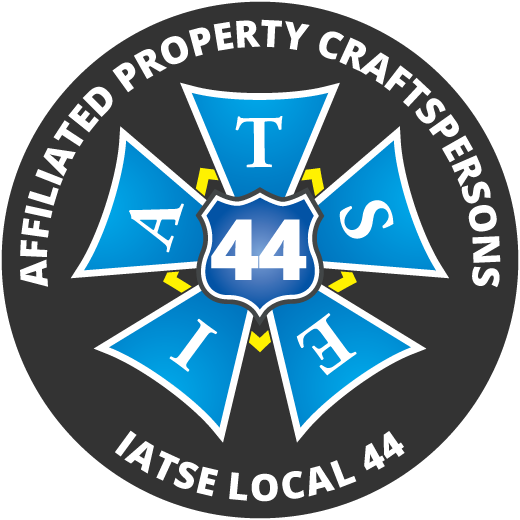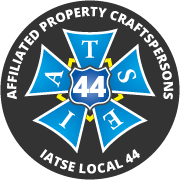PROPMAKERS
Propmakers are the core personnel of virtually all studio construction, either on the lot or on location. They can be found swinging hammers, welding metal, using nail guns, cutting with saws and torches. They build anywhere -- underwater or in a tunnel, suspended from a telephone pole or atop an office building -- from the low seas to the high skies, and everywhere in between.
These versatile craftsmen handle everything from larger construction tasks to the finer details of carpentry, working with such varied materials as wood, glass, rubber, plastic, metal, leather, formica -- name it, and they build with it.
Unless the job calls for a member of another specific craft within the construction area -- such as painting, plumbing, plastering or masonry -- it is probably a Propmaker who is wielding the tools.
Propmakers may also participate -- usually under the studio maintenance department -- in permanent construction, maintenance and repair of the studio infrastructure.
CREW RESPONSIBILITIES. Propmakers' duties vary depending upon the job. They are asked to execute an aspect of the blueprint (whether it is to build a structure, or add a facade to an existing structure) or even to make a repair.
Traditionally the Construction Coordinator confers with the General Construction Foreman on the tasks which need to be completed (See "Construction Coordinator" section for more details on this important job).
General Construction Foreman. Takes direction from the Construction Coordinator and executes the Coordinator's orders. The General Foreman's responsibilities may include:
• Delegating job responsibilities to the appropriate parties.
• Giving orders to Sub Foremen.
• Reviewing the requirements of the shooting schedule.
• Overseeing construction after on-site conference with the Construction Coordinator and Production Designer, including initial construction of the production offices, or "goldrooms," for the various on-set departments.
Sub Foremen. Assigned to specific shop responsibilities -- there could be a Mill Foreman for any mill work, a Stage Foreman for onstage construction and assembly, and a Locations Foreman who oversees each location. Each of these foremen sets up shop and oversees production requirements specific to his/her position within the overall production. Their responsibilities may include:
• Ensuring that work is performed on schedule at specific station.
• Handling crew sheets.
• Ordering materials.
• Building sets within budget.
Gang Bosses. Assigned to each of the Sub Foremen. Gang Bosses are usually the more experienced members who relay and implement the instructions of the foremen to the members of the crew. A Gang Boss:
• Builds sets alongside Journeymen.
• Serves as a source of information and advice to Journeymen.
Journeymen Propmakers. Execute whatever building instructions they are given regarding the job assigned to them. The Propmakers:
• Arrive with minimum tool list as required in contract (see "Tool List" below)
• Should be on time, and ready to begin work at designated work call (The contracts in no way allow for or protect any tardiness).
TOOL LIST. Journeymen must report to work with a complete set of tools as outlined in Exhibit "B" in the Black Book:
• 16 oz. Claw Hammer
• 25' or 30' Measuring Tape
• 100' Measuring Tape
• 12" Combination Square
• Framing Square
• Bevel Square
• 8 pt. Hand Saw
• 12 pt. Hand Saw
• Back Saw
• Key Hole Saw
• 1/4" - 1/2" - 3/4" - 1" Wood Chisels
• Cold Chisel
• Box Plane
• Hand Axe
• Two Chalk Boxes
• Dry Line
• Line Level
• 24" or 30" Level
• Compass
• Angle Dividers
• 24" or 30" Wrecking Bar
• 10" Vise Grip Pliers
• Pliers
• Diagonal Cutters
• Straight-head and Phillips-head Screwdrivers
• 10" Crescent Wrench
• Nail Sets - Various Sizes
• Wood Files - Various Types and Sizes
• Sharpening Stone
• Tool Belt
• Assorted Pencils and Marking Crayons
• Plumb Bob
• Utility Knife and Blades
• Gloves
• Cordless Drill
• Large Ratcheting Screwdriver (Yankee)
• Tool Box (with proper identification: "(Name)" and "Property Craftsperson - Local 44" )
SPECIAL NOTE ON TOOLS: Propmakers should be familiar with the rules governing supply of personal equipment and tool storage on page 59, section 63 of the Standard Agreement ("Black Book").
STAFFING CONSIDERATIONS. Propmakers are staffed as needed, with the understanding that every construction site should have a Foreman. In some instances, the General Foreman may also serve as a Stage Foreman -- usually on the largest stage -- in addition to overseeing the other stages or construction sites.
DEPARTMENTAL INTERACTION. As television and filmmaking is a collaborative process, communication between departments is necessary. In the interest of maintaining a good working environment, Propmakers handle a broad variety of construction-related requests from other departments -- they are available for any assistance required within their area of expertise. Propmaker Foremen may confer with the following departments:
(listed in alphabetical order)
• Art Department
• Electrical Fixtures Department
• Floorlayers
• Greenspersons
• Locations Manager
• Paint Department
• Plumbing
• Property Master
• Set Decorators
• Staff Shop
• Special Effects
QUALIFICATIONS. A Propmaker is recognized by Local 44 in one of two ways --
(1) Through traditional entry:
• Candidate works 30 days with one or more than one IATSE signator company within the last 365 days; and
• Candidate pays the required initation fees and dues, and is sworn in by Local 44 as a member.
- OR -
(2) Through the union organizing process:
• A non- union candidate is recognized by CSATF as having worked for 30 qualified days as a Propmaker on a show which has been organized by IATSE; and
• He or she pays the required initiation fees and dues, and is sworn in by Local 44 as a member.
Licensing. Certifications are encouraged for any type of specialty. Aerial Licenses (to operate Condors and Scissor-lifts), Powder-actuated Tool Licenses (e.g., "Hilti Guns"), Certifications in Welding, and Scuba Certificates are all helpful -- and often necessary depending upon the demands of the job at hand.
MINIMUM PROFESSIONAL STANDARDS. The skills of the Propmaker are directly drawn from the outside practical world. In filmmaking, only the variety of requests is different. A review of what is expected of Journeymen reveals a simple, common-sense approach to the work:
• A willingness to give the best of one's talents for a fair day's pay.
• A familiarity with tools.
• In possession of all tools on "tool list" when reporting to the set.
• An ability to read blueprints.
• Basics of carpentry, and an understanding of technical terms.
• A desire to self-educate, and a predilection for taking the initiative when desirable.
• A positive attitude.
• Public relations skills -- with employers, bosses, colleagues and particularly with the public when out on location.
• Development of specific skills which will ultimately make one more employable as a Propmaker in any of the following areas:
-Furniture Repair
-Locksmithing
-Hardware
-Cabinetry
-Plastics (Bondo, Vacuform)
-Rubber & Formica
-Wood (any kind for any purpose)
-Metal Shop Work
-Welding
-Glass Cutting & Installation
-Power Tool Use & Repair
-Saw & Tool Sharpening
-Powder-Actuated Tool Use & Repair
-Set Lay-out
-Aerial Lifts
-Aerial Safety/High work
-Ability to work above/below land and water
In general, any additional specialized knowledge which one can acquire will ultimately prove of value to the Propmaker.
ETIQUETTE FOR PROPMAKERS. As a Propmaker, you should:
• Treat others as you would wish to be treated yourself.
• Remember that location shooting depends upon good relations with the public. To that extent, "The customer is always right." If, for instance, the work call to a location house is set for 6:00 a.m., and the house owner arrives at the door insisting that he or she was told 9:00 a.m., the best course of action would be to apologize, withdraw and contact the Construction Coordinator or General Foreman for further instructions.
• Avoid negative statements -- in all cases, make every effort to satisfy whatever requests have been made by Production.
SAFETY. It is important for members to speak up on matters of safety. Any concerns or unsafe working conditions should be taken to the immediate supervisor or the union steward. Sometimes for instance, Propmakers are working alongside painters in a poorly-ventilated area. It is not part of the Propmaker's job responsibility to be exposed to hazardous fumes -- masks and safety equipment should be provided as required by the work environment. Journeymen should always feel free to alert the Shop Foreman about safety concerns without fears of reprisal -- unsafe working conditions were one of the main issues that inspired IATSE to form in the first place (for more specifics on the important subject of safety, see the "Safety" section).

